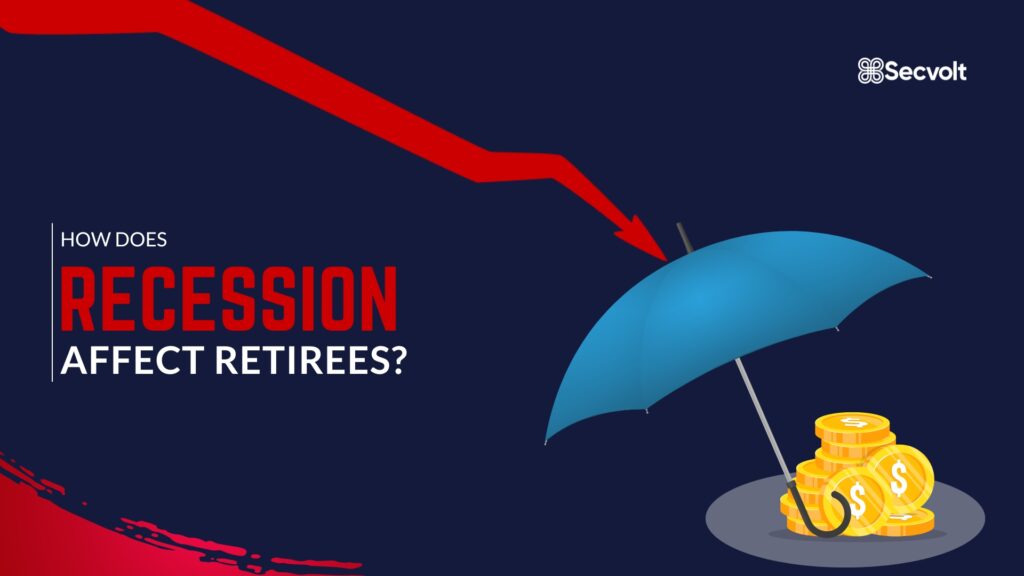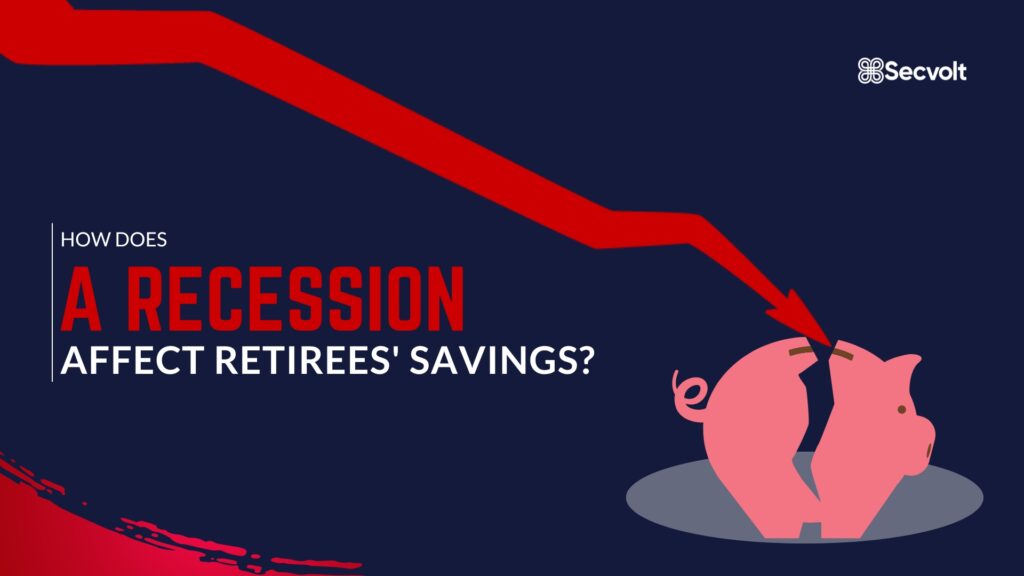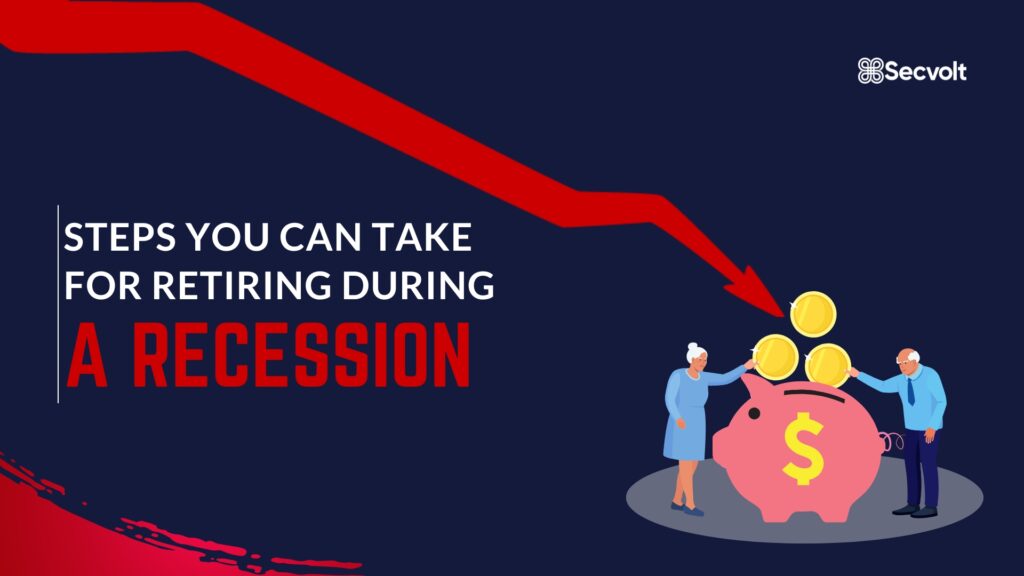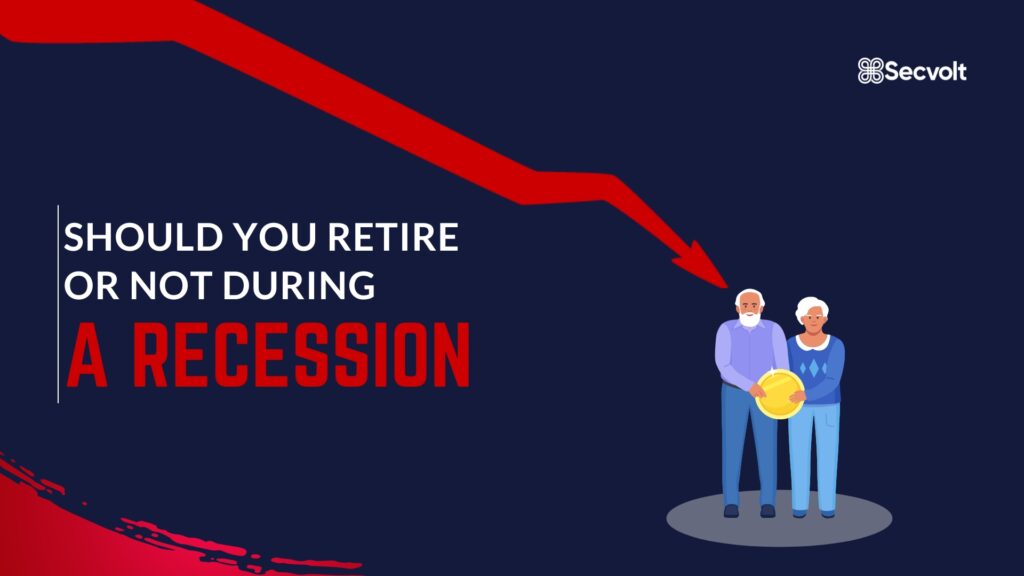Have you ever googled “RECESSION 2023”?
Whether you have or haven’t, you know that recession comes with a bunch of complexities, and this coming recession has already started showing bizarre signs.
Franklin D. Roosevelt said, “The only thing we have to fear is fear itself.”
While this phrase is frequently referenced as a battle cry for fortitude and perseverance in the face of economic uncertainty, it is also pertinent for retirees who may be concerned about how a recession may impact their financial stability and how they can plan on retiring in a recession.
Many of you have worked hard for decades to prepare for your golden years as retirees, and the idea of a recession can be unsettling amongst those plans.
This article will examine the effects of the recession and how they harm retirees. We will also discuss the tactics and recession plans that one should follow to overcome the coming recession.
Let’s start by knowing what recession stands for.

What Is Recession?
A recession is a significant, widespread, and prolonged decline in economic activity. Generally, two consecutive quarters of negative GDP indicate a recession.
Recession is a term that has its ways of affecting people. Be it the rich, poor, or even retirees, everyone is affected differently.
Recession is the most challenging time for retirees, as it declines the value of their hard-earned and saved money, directly affecting the solvency of the organizations that provide their pensions.
Let’s find out how a recession could affect retirees’ savings.

How Does A Recession Affect Retirees’ Savings?
Here are a few ways in which a recession affects retirees’ savings:
- Investment Value Falls: A recession may cause a decline in investments such as stocks, bonds, and real estate, affecting the value of retirement accounts that include these sorts of investments.
- Pension Risk: A recession can also threaten the viability of pension-offering organizations, such as corporations and governments. Pensioners may not receive their promised amounts depending on the company’s financial situation.
- Risk Of Unemployment: A recession could likely lead to higher unemployment, reducing retirees’ part-time or consultancy income.
- Higher Inflation: Higher inflation, or the pace at which the overall price level of goods and services rises, can reduce the buying power of retirement savings.
- Delay Retirement: Some people may want to delay retirement until the economy recovers and their assets are back on track again. Delaying retirement might be a good option to stick to in a recession.
It is crucial for retirees to carefully review their financial situation and take action to safeguard their investments during a recession. And the best way to plan your retirement during a downturn is to follow the steps & procedures mentioned in the next section.

Steps You Can Take For Retiring During A Recession
Following are some steps you can take to prepare your retirement plans amid the recession-
- Examine Your Budget: Consider ways to save costs, such as reducing non-essential purchases or canceling subscriptions.
- Delaying Retirement Withdrawals: Consider postponing the withdrawal of funds from your retirement account.
- Maintain An Emergency Fund: Keep an emergency reserve that can cover at least a few months’ worths of costs in case of unexpected financial difficulties.
If you need some ideas about what to read next, here they are:
- Recession Or The Next Great Depression? How To Survive And Thrive Afterward
- Can Recession Be A Good Thing For Businesses?
- 7 Things To Do When You Retire Early (Financial)
- Find Ways To Increase Your Income: Working part-time or having an extra source of income might assist in boosting your income during a recession.
- Stay Informed: It’s always a good idea to be updated about the economy’s health and any changes to your retirement income sources so that you can make the necessary adjustments.
These are the steps you could take for your retirement plans during a recession.
Although a recession could make everyone’s life difficult, for those who are inching towards retirement, as discussed above, it could bring many more problems.
Thus, if you are wondering whether a person should retire during a recession, we must first consider some points. In the next paragraph, let us discuss those.

Should You Retire Or Not During A Recession?
Retirement during a recession can be tricky since it requires balancing both the risks and benefits of retirement. The following are a few things to consider before making a decision:
- Secure Job: If you have stable employment and an improved economic outlook, you may postpone retiring until the job market improves. This allows you to continue saving for retirement while weathering market downturns.
- Retirement Funds: If you’re nearing retirement and your savings have been adversely harmed by the recession, you may postpone your retirement until your savings have had a chance to recover.
- Personal Financial Situation: If you have a solid financial foundation and a well-diversified investment portfolio, you may be able to retire during a downturn. This enables you to capitalize on any prospective buying opportunities that may come during a market slump.
- Health & Lifestyle: If you’re in excellent health and love your job, you could opt to keep working even if the economy is down. This can give a feeling of purpose as well as a social connection.
Finally, your specific financial condition and ambitions will determine whether or not to retire during a recession. Before making a choice, you should consult a financial professional and thoroughly evaluate your alternatives.
In the last section, let us look at a fantastic alternative that can help you fight the recession as well as make excellent retirement plans.
The Bottom Line
A recession may have a wide range of repercussions on people and their money, but the suffering experienced by retirees is unparalleled.
This article discusses the effects of the recession and how it harms retirees’ savings. Recession is already a complex situation, and on top of that, planning for retirement could make everything even more overwhelming.
What you can do is invest in a firm that is recession-proof and can stand strong against recession. Secvolt is one such hedge fund that will help you enhance your portfolio even during a recession. They keep an eye on all your needs related to risks & returns and help you reach your financial goals & beyond. Good numbers on your portfolio & efficient risk management systems can help you plan your retirement easily during a recession.
So, whether you want to retire with Secvolt or retire with the recession? The choice is yours.



